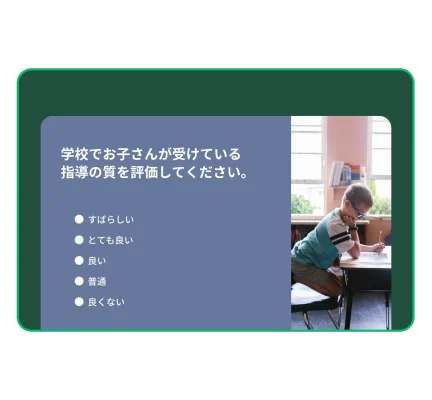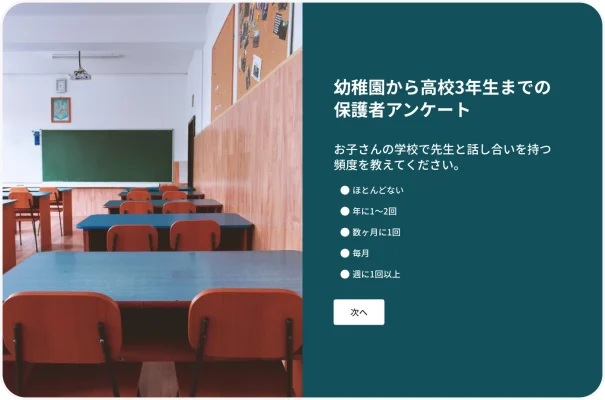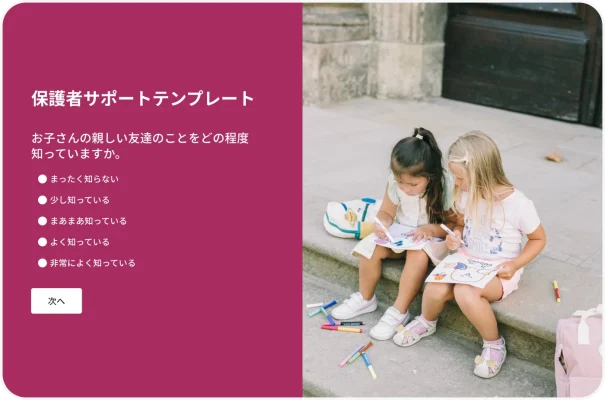
保護者は国を問わず、子どもの学習にもっと関与したいと思っている。そして、保護者の声によく耳を傾ける学校はこのような期待に応えやすい。これらは、Varkey Foundation(バーキー財団)が実施したグローバル保護者アンケートで明らかになったことです。
保護者アンケートを実施するメリットは、教育者が情報に基づいた決定を行うのに役立つだけでなく、保護者が子どもの教育に関する意見を述べられる点にあります。アンケートを実施してコミュニケーションを強化し、エンゲージメントを高め、ひいては生徒の学習成果を伸ばすのに役立つ貴重なフィードバックを集めましょう。
この記事では、保護者に働きかけ、生徒の学びの成果を高めることを目的とした、50問以上の保護者アンケート項目と、専門家が作成したアンケートテンプレートをご紹介します。
保護者アンケートとは
保護者アンケートは、学校の管理者や教育者が子どもの教育に関するフィードバックを保護者から収集するために使用するツールです。
保護者アンケートには一般的に、学校環境、学業に関するサポート、教師とのコミュニケーション、学校への総合的な満足度などに関する質問が含まれます。保護者が意見を伝えられるようにすることで、生徒の教育に最も影響を与える関係者の一人から意見を直接聞くことができます。
ハーバード教育大学院のKaren Mapp博士が2002年に発表した論文、「A New Wave of Evidence」では、保護者の関与が生徒の学業成績、共通テストの成績、社会的能力、および卒業率を高めることを明らかにしています。
保護者アンケートは、保護者が必要としていることや懸念していること、また学校で生徒の学習と成長を効果的に支援する方法を把握するために重要な役割を果たします。こうした情報を学校で次のために活用できます。
- 実施しているプログラムの評価
- コミュニケーション戦略の強化
- より包括的で支援の充実した教育環境を整える
初めてでも使いやすいツールをお探しですか?
保護者エンゲージメントアンケートのテンプレートを使って、保護者からフィードバックを集め、生徒の学習成果を高めましょう。
尋ねたい保護者アンケート項目: 50問以上
保護者の関与が教育にプラスの影響を与えるよう、SurveyMonkeyはハーバード教育大学院のHunter Gehlbach博士と共同で、幼稚園から高校までの教育機関で適切な質問をしやすくする質問集を作成しました。
Gehlbach博士とそのチームは、家庭と学校の関係に関わる主要分野を評価するアンケート質問を作成するために、専門的なプロセスを採用しました。学術論文、保護者へのインタビュー、フォーカスグループ、専門家パネル、アンケート作成のベストプラクティスを参考に、以下の主要分野を網羅した保護者アンケートテンプレートが完成しました。
50問以上の保護者アンケート項目をご紹介しますので、ぜひご活用ください。
学校とのコミュニケーション
- 学校からの連絡はどのくらいの頻度でありますか。
- 学校からの連絡手段として好ましいのは何ですか。
- どの種類の情報が最も役に立つと思いますか。当てはまるものをすべて選んでください。
- 現在の学校からの連絡にどの程度満足していますか。
- 学校からの連絡のタイミングは適切だと思いますか。
- 学校が提供する情報はどの程度明確ですか。
- 学校からの連絡を受け取る際に問題がある場合、どのような問題がありますか。当てはまるものをすべて選んでください。
- 学校からの連絡を改善するためのご提案があればご記入ください。
- 学校は、あなたの質問や懸念にどの程度適切に対応していると思いますか。
カリキュラムと学習
- 現在の学校のカリキュラムにどの程度満足していますか。
- カリキュラムはお子さんの教育ニーズを満たしていると思いますか。
- カリキュラムの中で、さらに重点を置く必要があると思う科目は何ですか。
- 学校の教育の質を総合的に評価してください。
- 学校はどの程度、生徒が将来の学業での成功に向けて備えられるようにしていると思いますか?
- 現在のカリキュラムの強みは何だと思いますか。
- カリキュラムについて改善のご提案があれば教えてください。
- お子さんの進度に関する情報をどのくらいの頻度で受け取っていますか。
- 学校は、お子さんの学習のために適切なリソースや支援を提供していると思いますか。
- あなたはお子さんの教育にどの程度関与していると思いますか。
学校の環境と安全
- 学校の環境を総合的に評価してください。
- 学校で実施されている安全対策にどの程度満足していますか。
- どの安全対策が学校で最も効果的だと思いますか。当てはまるものをすべて選んでください。
- 安全上の懸念に関して、学校の教職員はどの程度話しやすいですか。
- 安全についての方針やインシデントに関する学校からの連絡を評価してください。
- お子さんにとって学校はどの程度安全な場所だと思いますか。
- いじめに対する学校の対応にどの程度満足していますか。
- 学校は、メンタルヘルスに関する懸念にどの程度適切に対応していると思いますか。
- 学校の環境と安全を改善するためのご提案があればご記入ください。
保護者の関与
- お子さんの担当教員とどのくらいの頻度でコミュニケーションを取っていますか。
- よく参加する学校のイベントは、次のうちどれですか。当てはまるものをすべて選んでください。
- お子さんの宿題をどのくらいの頻度で手伝っていますか。
- あなたはお子さんの教育にどの程度関与していると思いますか。
- 保護者の関与は、お子さんの学業成績の向上にどの程度重要だと思いますか。
- 学校で保護者が関与する機会は十分にあると思いますか。
- お子さんと一緒に学校関連の活動に費やす時間は、1週間に何時間ですか。
- お子さんの担当教員とは、どの程度コミュニケーションが取りやすいと思いますか。
- 学校の委員会や保護者会にどのくらいの頻度で参加していますか。
生徒支援サービス
- 総合的に見て、学校の生徒支援サービスにどの程度満足していますか。
- お子さんが利用したことがある生徒支援サービスはどれですか。当てはまるものをすべて選んでください。
- カウンセリングは、お子さんの情緒的・精神的な健康を支援するためにどの程度効果的だと思いますか。
- 学校のチュータリング制度はどの程度利用しやすいですか。
- 学校の特別教育支援にどの程度満足していますか。
- 学校の生徒支援サービスを他の保護者に薦める可能性はどの程度ありますか。
教職員のパフォーマンス
- 当校の教員の総合的なパフォーマンスにどの程度満足していますか。
- 教員は、お子さんの学習ニーズにどの程度効果的に対応していますか。
- 教員以外の職員があなたの懸念にどの程度迅速に対応してくれたかを評価してください。
- 学校の管理者は、どの程度親しみやすく協力的ですか。
- 教員のパフォーマンスについて、どの点に最も満足していますか。当てはまるものをすべて選んでください。
- すべての生徒にとって安全で包括的な環境を確保するための学校の取り組みに、どの程度満足していますか。
全体的な満足度
- 当校の総合的な教育の質に対する満足度を教えてください。
- 学校と保護者のコミュニケーションを評価してください。
- 学校の設備やリソースにどの程度満足していますか。
- 課外活動にどの程度満足していますか。
- 教員の質を評価してください。
- いじめに対する学校の対応にどの程度満足していますか。
- 当校の最大の強みは何だと思いますか。
- 最も改善が必要だと思う分野は何ですか。
将来の進路と期待
- お子さんの将来について主に心配していることは何ですか。当てはまるものをすべて選んでください。
- お子さんにとって、大学に通うことはどの程度重要ですか。
- お子さんには高校卒業後、どのような種類の教育を望んでいますか。
- お子さんにはどのようなキャリアパスを期待されていますか。
- お子さんが自身の将来の目標を達成する力について、どの程度確信を持っていますか。
- お子さんが将来成功するために身につけるべき最も重要なスキルは何だと思いますか。当てはまるものをすべて選んでください。
- お子さんの進路(進学)にどの程度関与する予定ですか。
- お子さんの進路について、専門家に相談する可能性はどの程度ありますか。
関連トピック: 尋ねたい生徒・学生向けアンケートでの主な質問
保護者アンケートテンプレート
学校の校長、各学区の職員、教育委員会、PTAに携わる方々には、国公立校、各種私立校、特別認可校、都市部、地方などを問わず、保護者アンケートを使って保護者との関係について現状を把握することをお勧めします。
さらに、アンケート結果を他の学校や団体での実施結果と比較すれば、状況をより大局的にみることもできます。ベンチマークを見つけて保護者エンゲージメントデータを比較することで、現実的な目標を設定し、学校と保護者のやり取りにおける強みを理解しましょう。
保護者エンゲージメントアンケート

保護者エンゲージメントアンケートは、保護者が子どもの学校生活にどの程度関与していると感じているのかを測定するのに最適です。学校が保護者とどの程度効果的にコミュニケーションをとっているのか、保護者の関与を促す機会がどこにあるのかを把握できます。保護者エンゲージメント アンケート テンプレートを使って、保護者が最も関与していると感じていること、さらには、もっと積極的に役割を果たしたいと思っていることを発見しましょう。
保護者サポートアンケート
保護者サポート アンケート テンプレートは、保護者が学校に求めているサポートの種類を知るために作成されたテンプレートで、家庭が子どもの学びを支える上で役立つリソースや支援を明らかにします。学習指導や課外サポートなどに関する質問が含まれます。
幼稚園から高校3年生までの保護者アンケート

この汎用的なアンケートは、特に幼稚園から高校までの子どもがいる家庭を対象に作成されています。幼稚園から高校3年生までの保護者アンケートテンプレートでは、学校のプログラム、教員とのコミュニケーション、総合的な満足度についてのフィードバックを収集し、保護者の視点を総合的に把握します。
子どもの行動アンケート
子どもの行動アンケートでは、保護者が家庭や学校での子どもの行動をどのように捉えているかに焦点を当てます。子どもの行動アンケートテンプレートは、行動に関する懸念を把握し、その課題に対処するために必要な家庭と教員の協力関係を築くための貴重なツールです。
保護者の自己効力感アンケート
このアンケートでは、子どもの学業を支えることに保護者がどの程度自信を持っているのかを把握します。保護者の自己効力感アンケートテンプレートは、保護者にさらなるリソース、トレーニング、励ましが必要な領域を特定する上で、特に役立ちます。
学校カリキュラム適性アンケート
学校カリキュラム適性アンケートでは、学校のカリキュラムが保護者の期待や生徒のニーズにどの程度沿っているかを評価します。学校カリキュラム適性アンケートテンプレートは、期待やニーズとカリキュラムとのギャップを見つけ出し、今後の改善の指針とするための実用的なツールです。
保護者の役割と責任アンケート

保護者の役割と責任アンケートでは、保護者が子どもの教育における自身の役割をどのように認識しているかを調べます。保護者の役割と責任アンケートテンプレートを使うことで、保護者と教員の関係と、双方の期待を明確にすることができます。
保護者アンケートの作成方法
優れた設計のアンケートを作成すれば、学校でのコミュニケーションから学業のサポートまで、あらゆる内容の貴重なフィードバックが集まります。しかし、アンケートの設計が良くなければ、回答率が下がり、データに不明な点が多く、保護者の視点を理解できずに終わるかもしれません。
そこで、アンケートの的を絞り、効果的で、保護者が回答しやすい設計にするための手順を詳しくご紹介します。
目標を設定する
質問やアンケート設計を検討する前に、まずはアンケートで何を知りたいかを決めなければなりません。これは、研究論文の最初の段階で設定するリサーチクエスチョンのようなものです。
フィードバックが必要な分野は、学校でのコミュニケーション?学習プログラム?それとも保護者の関与?明確な目標を設定することで的を絞った質問が生まれ、実用的なインサイトを引き出すことができます。
適切なアンケートツールを選ぶ
先生だって、適当な裏紙に書かれた宿題など受け取りたくはないでしょう。アンケートの重要性を保つためには、信頼できるプラットフォームを使ってアンケートを作成し、配信する必要があります。
学校向けに専門家が作成した保護者アンケートテンプレート以外にも、SurveyMonkeyは使いやすいツールを提供して、アンケートの作成、送信、分析をお手伝いします。AIを活用したアンケートツールを使って、調査の専門家のようにアンケートを作成して結果を分析しましょう。
明確で適切な質問をする
5段落でまとめる小論文の構造をイメージしてください。論文のテーマ(主張)を書いてから、主張の裏付けを3つの段落で説明し、最後に要約で締めくくります。この論文で最高得点を獲得するには、主張の裏付けを説明する段落が明確かつ適切で、効果的に主張を根拠付けている必要があります。
保護者アンケートにこれを当てはめると、調査の目的に沿ったアンケート質問が成功の鍵となります。シンプルかつ具体的で、目的に沿った質問になるよう心がけてください。複数選択肢、評価スケール、自由回答形式の質問を組み合わせて、量的・質的両方のフィードバックを収集します。
加えて、回答者のことを考慮してアンケート質問を作成することも大切です。アンケートのバイアスや離脱につながるような誘導、複雑すぎる言い回しは避けてください。
アンケートをテストする
アンケートを保護者全員に配信する前に、少人数の代表的な保護者に対して事前調査を行うことが重要です。
この試験段階は、授業で生徒同士で確認させるのと似ており、あいまいな点を見つけて、すべての回答者が理解しやすいよう、明確で簡潔な文にすることを可能にします。
さらに、事前にテストすることで、進め方の複雑さや技術的な問題など、回答しやすくする上での潜在的な課題をピンポイントで把握するのに役立ちます。このようにちょっとした手間をかけることで、保護者にスムーズかつ快適に回答してもらえます。
この最初のフィードバックループは、アンケートツールを洗練させて、全体的な効果を高め、幅広い保護者からデータを収集し、データの質と信頼性を最大限に高める上で非常に効果的です。
アンケートを配信する
保護者が普段から使い慣れている手段でアンケートを共有しましょう。
たとえば、給食の献立表を定期的に保護者にメールで送信しているなら、アンケートも同様にメールで配信すると良いでしょう。保護者にとって想定内の連絡手段だからです。あるいは、もし学校のWebサイトがあるなら、サイト内にアンケートを組み込むこともできます。
アンケートの目的と重要性を明確に伝え、回答を促してください。
結果を分析し、行動に移す
アンケートでフィードバックを受け取ったら、すぐに行動に移しましょう!データを確認して、傾向や懸念、改善点を発見します。
チュータリング制度についての情報を求めている保護者が増えているかもしれません。あるいは、家庭でどのように子どもの教育を支援すべきかを理解していない保護者がいるかもしれません。
得られたインサイトを利用して、カリキュラムや学校の計画を調整しましょう。また、フィードバックに基づいて行動する予定が立ったら、その旨を保護者にも伝えてください。子どもの学習環境の変化や、そのような変化の中で適切に生徒を支援する方法を家族は知りたがっているはずです。
関連トピック: 学校パフォーマンスのベンチマーク
保護者アンケート実施のヒント
保護者アンケートを効果的に実施するには、単に質問を並べて送る以上の工夫が必要です。有意義なフィードバックを得るために、徹底した計画、明確なコミュニケーション、正直な回答を促す環境づくりに手間を惜しまないでください。
以下のヒントを参考にして、回答率と回答の質を高め、できる限り多くのインサイトを集められるようにしましょう。
デモグラフィック情報を含める
子どもの学年、世帯収入、教育レベルなど、保護者に関する基本データを収集し、傾向を把握します。保護者のデモグラフィックアンケート質問を入れると、プログラムの調整、コミュニケーションの改善、エンゲージメント戦略の強化に役立ちます。
質問を明確で簡潔にする
学校生活の適切な側面に包括的に対応する、明確で実用的な質問を作成します。例としては、コミュニケーションや支援サービス、学習環境全般に関する質問が挙げられます。
それぞれの質問でじっくり考えて回答できるようにし、生徒のエンゲージメントやメンタルヘルスのリソース、安全対策、保護者の関与などを網羅して、教育を取り巻く要素を全体的に理解できるよう構成しましょう。
複数選択肢と自由回答形式の両方の質問を入れる
量的データではストーリーの半分しか伝えられません。保護者の大半から、「学校のチュータリング制度は利用しにくい」というフィードバックを受け取った場合を想像してみてください。なぜでしょうか。自由回答形式の質問なら、保護者が子どものためにチュータリング制度を利用できない理由を尋ねることができます。
たとえば、複数選択肢の質問を使って、「学校のチュータリング制度はどの程度利用しやすいですか」と尋ねます。続けて自由回答形式の質問で、「チュータリング制度の利用に関する経験について教えてください」といった質問をするとよいでしょう。
すると、保護者が子どもをチュータリングに登録する方法を知らないことや、もっと時間帯を増やしてほしいと思っていることなどが分かります。
結果を共有し、フィードバックの活用方法を説明する
教育は基本的に共同作業。教師、保護者、生徒・学生が協力して初めて最高の成果を出せるチームスポーツのようなものです。
アンケート結果は必ず、明確かつアクセスしやすい方法で保護者に伝えてください。このようにして透明性を確保することで、保護者は教室の状況、カリキュラムや指導法における今後の変更、子どもの学習を支援するために利用できる具体的な方策などを把握できるようになります。
保護者に情報を提供して巻き込むことによって、確固たる協力関係を構築することができ、ひいては生徒の成功と学校コミュニティ全体の関与を高めることにつながります。
アンケートを匿名にして正直な回答を引き出す
保護者の中には、子どもに対して悪影響が及ぶ可能性を恐れ、重要な意見を記入するのをためらう人もいることを認識しておかなければなりません。この恐れは、過去の体験や普段感じている力関係、教育システムに対する不信感などに起因している可能性があります。このような懸念に対処し、率直なコミュニケーションを促すために、回答が匿名であることを保護者にはっきりと伝えることが重要です。
アンケートの匿名化によって、個人を特定できる情報が収集されたり、回答に紐づけられたりすることを防げます。匿名であることを強調し、学校環境を改善するためにどのように回答を使用するかを知らせることで、保護者は子どもへの悪影響を恐れることなく、安心して意見を述べることができます。
関連トピック: 生徒・学生の投票で学校のエンゲージメントを高める
SurveyMonkeyでアンケートを作成しましょう
有意義な保護者アンケートの作成は、決して難しくありません。専門家が作成したSurveyMonkeyのテンプレートを使うことで、教育目標に沿い、教室での幸福度を高め、教師と保護者の仲間意識を醸成することができる保護者アンケートをすばやく作成できます。
SurveyMonkeyが提供しているツールで、簡単にフィードバックを収集し、結果を分析して、学校コミュニティで前向きな変化を起こせます。貴校でも始めてみませんか?SurveyMonkey教育ソリューションで、生徒の成功を支える効果的なアンケートを作成しましょう。
SurveyMonkeyが好奇心に火をつける様子をご覧ください
その他のリソースを見る

それぞれの役割に合ったソリューション
SurveyMonkeyが仕事の効率化をお手伝いします。成功する戦略・製品・体験で影響力を最大化する方法をご覧ください。

オンライン評価フォームで実用的なフィードバックを集める
オンライン評価フォームを作成・カスタマイズ。構造化されたフィードバックの収集、パフォーマンス評価、データに基づいた意思決定が簡単になります。

保育所登録フォームテンプレート
SurveyMonkeyの保育所登録フォームテンプレートで登録プロセスを単純化。直感的なフォームビルダーで必要に合わせてカスタマイズできます。

同窓会登録フォームテンプレート
同窓会登録フォームテンプレートで同窓生との繋がりを保ちましょう。直感的なフォームビルダーで必要に合わせてカスタマイズできます。